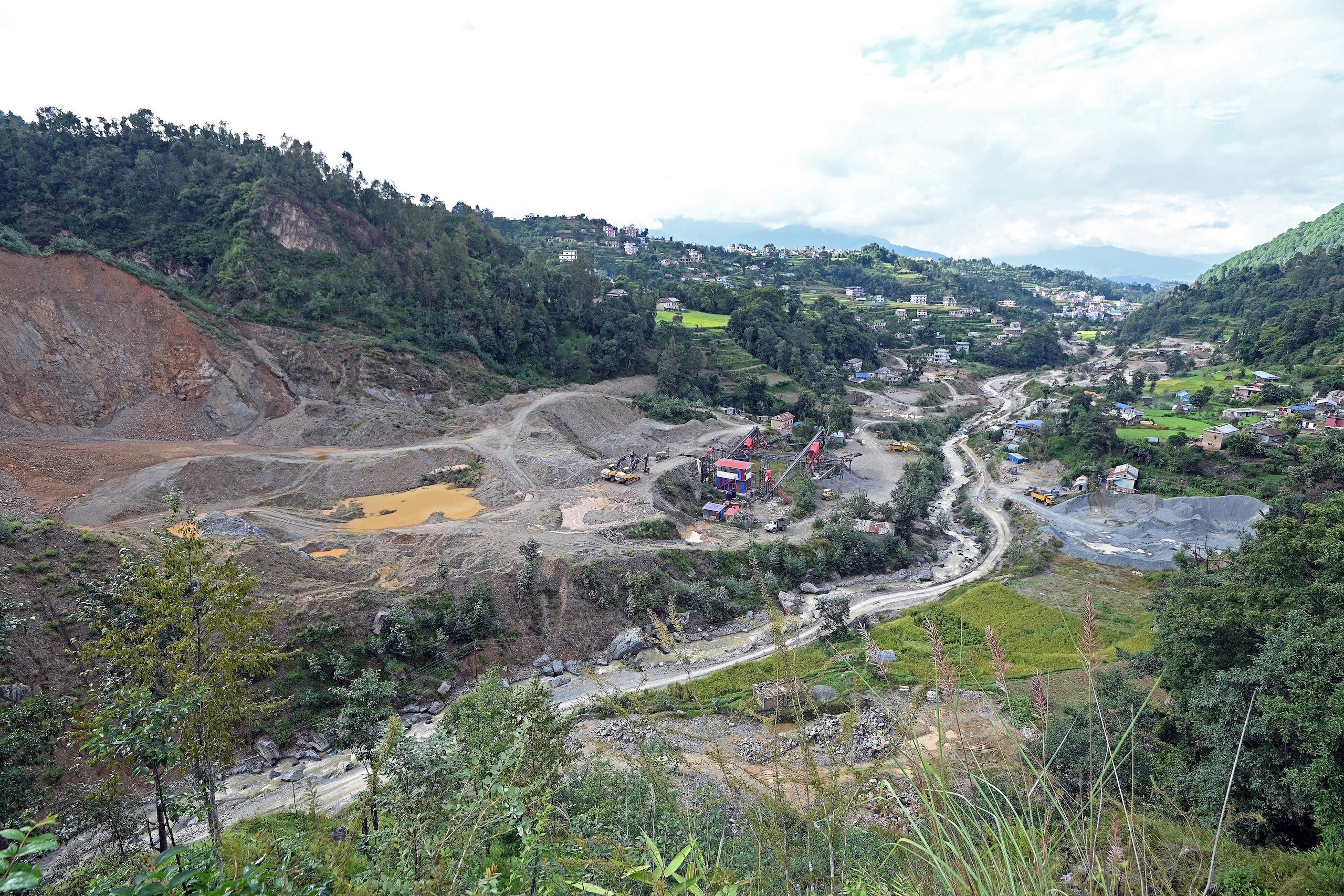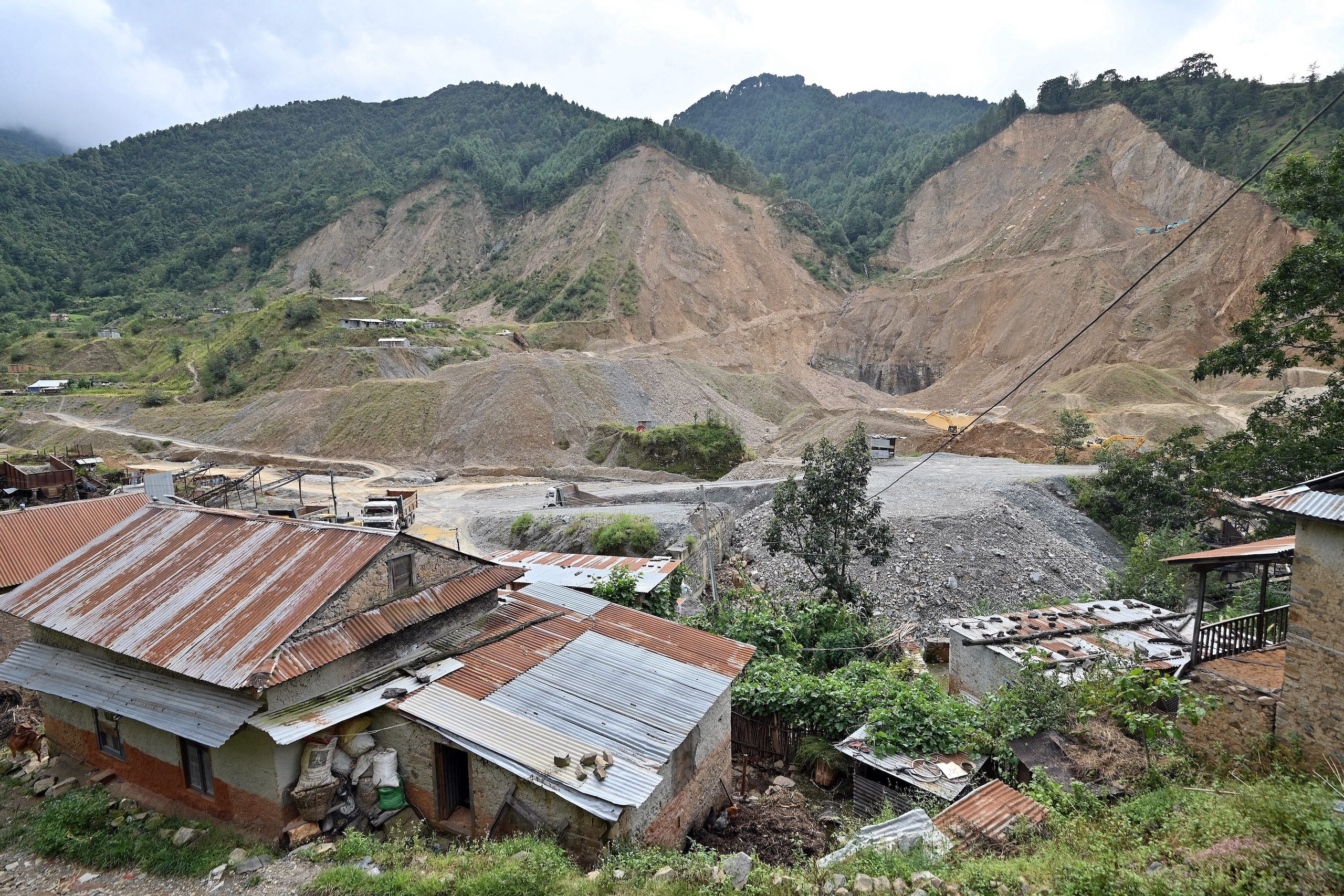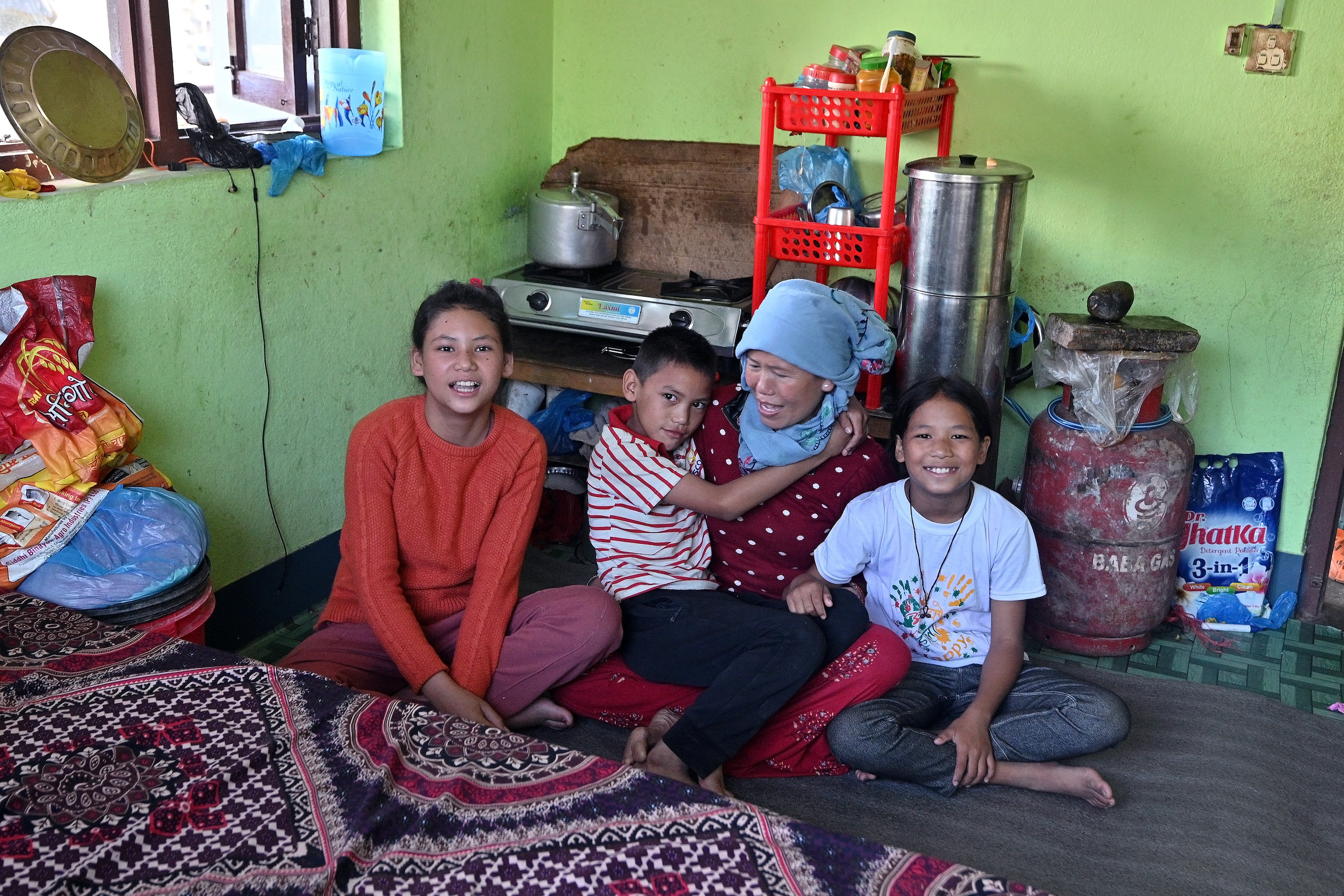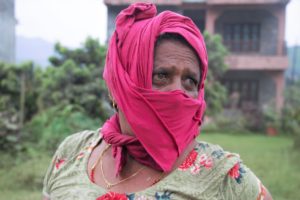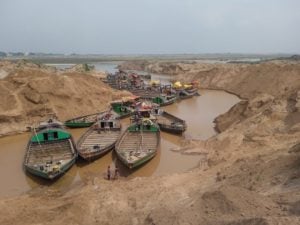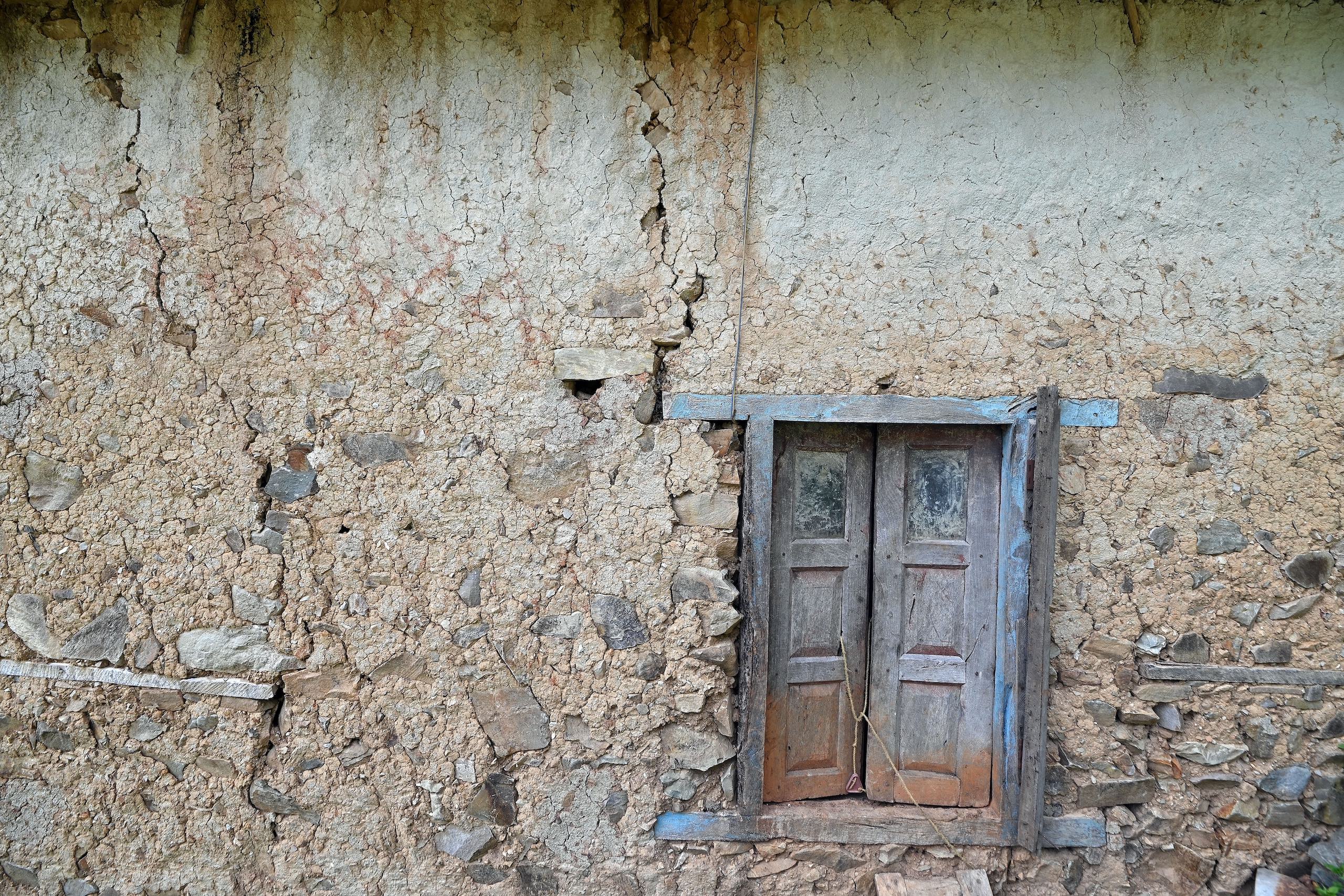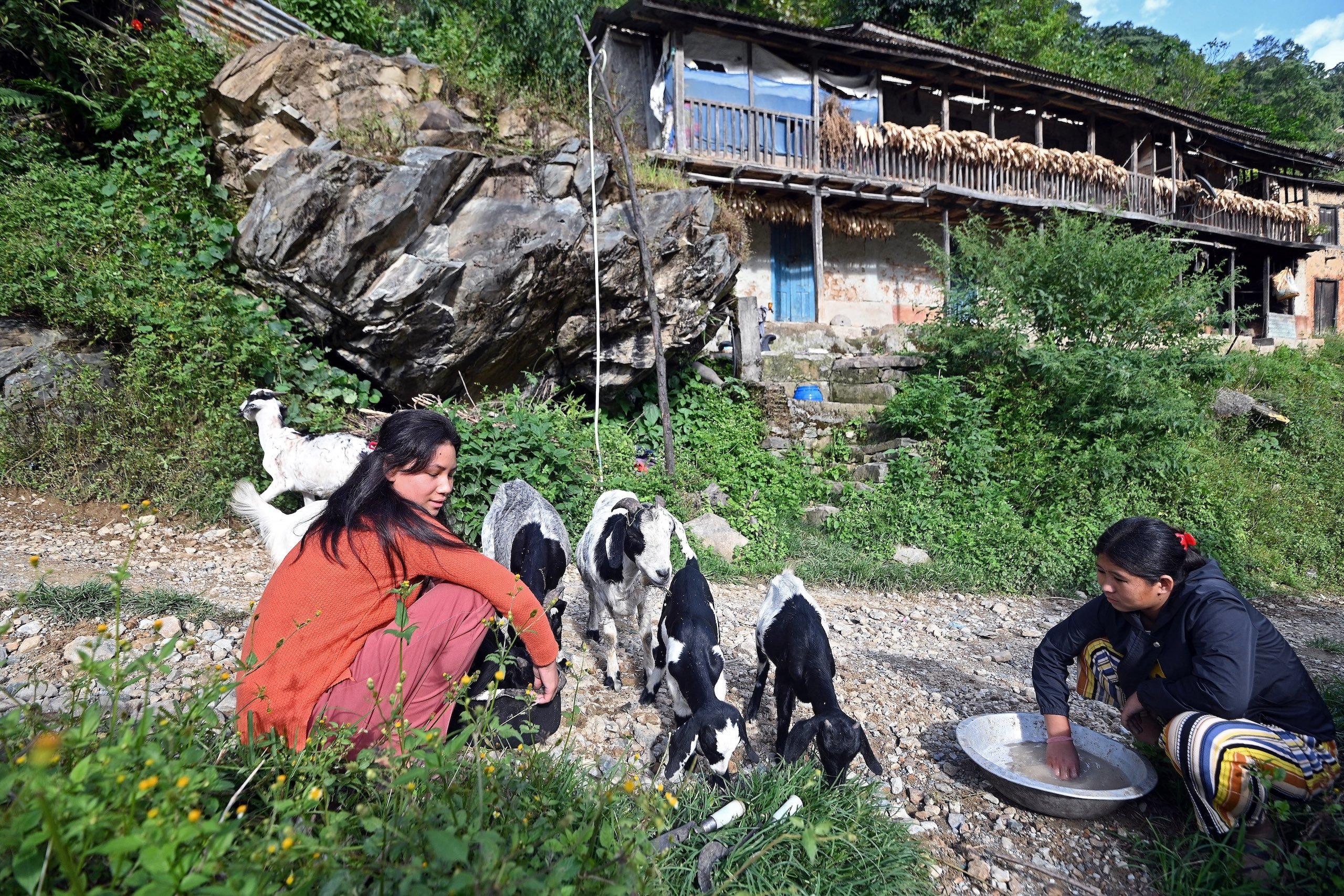
Dilkumari Nagarkoti’s daughters tend to their remaining livestock beside the abandoned family home in Tikabhairav Dhunge, Lalitpur – the impacts of an illegal mineral mine forced them to leave the village (Image: Susheel Shrestha)
Afew months ago, Dilkumari Nagarkoti’s family left their ancestral home in Kathmandu Valley, Nepal. They moved about five kilometres, from Tikabhairav Dhunge in Lalitpur to a rented room in Tikabhairav Bazar. The reason for their migration was the unbearable disturbance and threat posed by the stone crusher industry, which is in operation just metres from their old home.
“The house often shakes and has developed cracks,” says Nagarkoti. “It’s better to stay away than to [live] a sick life here.”
Her nine-year-old son Ashiq fell ill with pneumonia multiple times, exacerbated by the fine stone dust, which also subjected the family to irritated, inflamed eyes and constant headaches. Their daughters would leave early for school, skipping breakfast to avoid the trucks carrying cobbles and pebbles. One day, Nagarkoti’s eldest daughter Jenisha tearfully pleaded for an end to their suffering.
The family is now confined to one room and pays NPR 3,000 (USD 25) per month in rent. To meet the financial burden, Nagarkoti’s husband Junga Bahadur has moved north to Kathmandu for work as a driver.
Though they have moved, Nagarkoti regularly visits their former home to feed the animals they couldn’t bring with them. The family used to have 35 goats and 500 chickens, but the limited care Nagarkoti can now manage has forced her to reduce their numbers to seven and five respectively.
Nagarkoti complained to the municipal ward office, but to no avail. This is perhaps unsurprising, given that Bishnuman Maharjan, the President of Godavari Ward Number Six (where Nagarkoti’s former home lies), owns and operates Sagarmatha Stone Crusher and Manakamana Aggregate Industries in the same area.
On condition of anonymity, local residents told The Third Pole that Maharjan employs environmentally destructive practices.
Speaking to The Third Pole, Maharjan responds to these accusations: “Development and destruction go hand-in-hand. Without crushers and mining, there would be no job opportunities for locals as most of them are drivers and operators [of equipment].” The municipal ward office was unable to share data regarding how many locals are employed by this mining.
The case of Bijaya Basnet
Others in Nepal have suffered more than just a lack of response when protesting the environmentally damaging practices of stone crushers.
Eighty kilometres southwest of Kathmandu in the town of Hetauda, Bijaya Basnet has been fighting illegal crushing practices for years. A former chairperson of a secondary school, Basnet complained about the noise, dust and smoke coming from a crusher processing plant situated just 500 metres from a school. According to the Ministry of Industry, Commerce & Supplies’ Stone, Gravel and Sand Mining Sale and Management Standards, released in 2020, this distance should be at least two kilometres.
“The sound of tractors and tippers disturb classes as both teachers and students struggle to hear each other,” says Basnet.
Throughout 2013, he raised the issue at the ward and municipality levels, with Hetauda’s department of cottages and small industry, as well as with the district coordination committee office and the electricity authority office. Basnet says he did not receive any responses.
In 2019, Basnet travelled to Kathmandu and filed a complaint with the Commission for the Investigation of Abuse of Authority (CIAA), a copy of which he showed to The Third Pole. Eventually, he says, Basnet was pressured to resign from his job after receiving threats from local leaders and gangsters. “I haven’t heard any response from the CIAA yet,” he adds.
The cost of federalism
Research such as Tribhuvan University’s 2007 paper, Status of sand mining and quality in northern Kathmandu, cites protests and concerns about the illegal exploitation of rivers and minerals from as far back as 2005. However, it seems these problems have often been amplified since the passage of Nepal’s new constitution in 2015, which installed federalism. Then in 2017, parliament passed Nepal’s Local Government Operation Act, which granted municipalities the authority to issue contracts for the extraction and collection of river materials. Before 2015, this power had rested only at the central government level.
A complicating factor is that many politicians are themselves involved in mineral extraction. More than 200 representatives elected in Nepal’s 2022 municipal elections had “a direct or indirect stake in local businesses, particularly construction-related contract businesses”, which are dependent on mining and crushers. This was out of a total of 753 mayors or chairpersons, 753 deputy mayors and chairpersons, and 6,742 ward chairpersons.
Federalism has accelerated development at the local levels, but meanwhile it has also decentralised the adverse effects
Bhushan Tuladhar, environmentalist
During Nepal’s 2022 federal elections 275 parliament seats were contested. The Federation of Contractors Association of Nepal claims that 17 of those seats were won by contractors, as were 18 of the 550 provincial seats that were also being voted on; the association shared lists with The Third Pole that support these claims. Those contractors include mine and crusher owners.
For most politicians, there seems to be little understanding of this inherent conflict of interest. For example, Maharjan asks The Third Pole: “Why can’t a representative make cash out of their business?”
The Third Pole speaks to Bhushan Tuladhar, an environmentalist: “With the [federal] government and local authorities repeatedly turning a blind eye, it appears to be more of a governance issue rather than an environmental [issue] alone. It hints at the vested interests at the core [of decision-making]. Federalism has accelerated development at the local levels, but meanwhile it has also decentralised the adverse effects.”
Furthermore, decentralisation has created conflicting jurisdictions. “Overlapping laws have created a risk of tussle between local and provincial governments in the name of collecting revenue,” says Balananda Poudel, who chairs the National Natural Resources and Fiscal Commission. This constitutional body is charged with ensuring the equitable distribution of natural and fiscal resources among federal, state and local governments.
No resources for proper monitoring
On paper, the instructions are clear: according to Nepal’s Stone, Gravel and Sand Mining Sale and Management Standards, it is prohibited to mine and collect river products within two kilometres of settlements and forest areas, within 500 metres of highways, and within one kilometre of a road bridge or suspension bridge. But according to Rishidev Phuyal, who is the District Development Committee Chief (Lalitpur’s most senior government official), the government lacks the resources and manpower to monitor and enforce these regulations. “There is also a lack of collaboration among the forest and survey departments and the police administration,” he adds.
While the administration is hamstrung for resources, Padam Shrestha says the mining industry is not. An environmental lawyer, researcher and activist, Shrestha tells The Third Pole: “Out of 753 municipal levels, more than half are involved in this business, without following proper standards.”
Shrestha says municipalities are awarding contracts to themselves, as well as overseeing them and collecting revenue. With no real mechanism to make anybody pay for conducting illegal mining, Shrestha says there is limited incentive to enforce regulations: “This is why rampant illegal mining has proliferated.”
In 2022, an amendment to Nepal’s Stone, Gravel and Sand Mining Sale and Management Standards actually shortened the permitted distances between mining operations and other places. When Shrestha challenged this, the supreme court issued a stay order that blocked the amendment. “But the businesses are running as usual,” he adds – which means they are flouting standards.
“All of us are illegal”
According to a Ministry of Home Affairs document shared with The Third Pole, more than 700 of the 1,140 crusher industries in Nepal that were found to not be meeting legal criteria were closed down in January. Within a month, they were all reopened.
“Due to the new standards promulgated for environmental protection, no crusher industry in the country has renewed its license since 2016,” claims the president of the National Federation of Crusher Industries, Sitaram Neupane. “By this [standard], all of us are illegal. The standards imposed by the government, without consulting stakeholders, have left us indecisive.”
Beyond the need for consultations, there is the issue of whether there can ever be one set of mineral mining standards for the whole country – Nepal’s plains, hills and high mountains each have different needs.
The Third Pole speaks to the Ministry of Forests and Environment’s undersecretary, Madhu Ghimire: “Our standards need to be region-specific and there should be effective monitoring of environmental impact assessments and initial environmental examinations.” Ghimire also acknowledged that “[current] monitoring is weak.”
One solution may be a new parliamentary bill that seeks to clarify the “management and regulation of construction materials”. According to Kumar Bhattarai, a Ministry of Federal Affairs and General Administration spokesperson, “we have already drafted the bill and sent it to the cabinet for discussion.”
Shrestha is certainly supportive of more robust mineral mining rules: “We need an accountable law to guide and monitor local-level river extraction, mining and crushers. It is the fundamental right of the Nepalese to have a healthy environment.”


